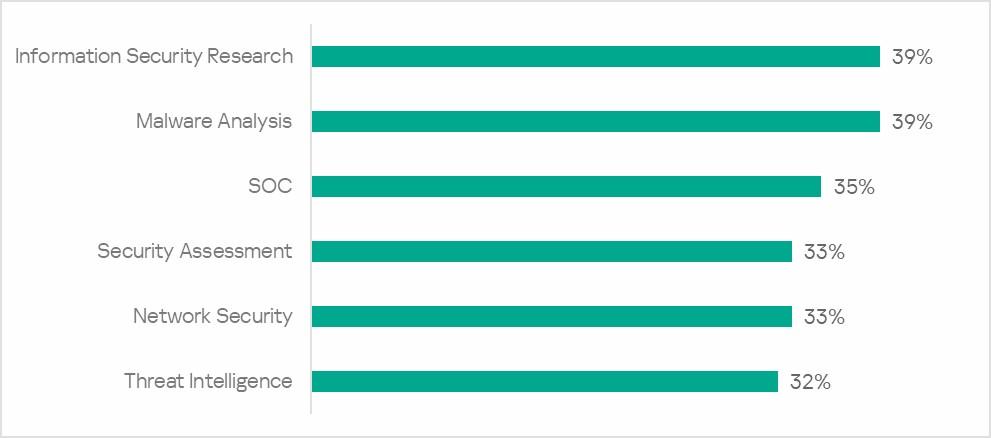InfoSec experts shortage: Almost half of companies struggle with understaffing
According to the recent Kaspersky study, more than 40% of companies worldwide are facing a shortfall of qualified cybersecurity professionals. Most understaffing can be found among Malware analysts and Information security researchers.
As the frequency and complexity of attacks increase, and the demand for InfoSec professionals in business grows, the number of practitioners meeting the company’s requirements for skills and level of expertise is declining. Studies carried out by cybersecurity companies and international organizations have already highlighted the lack of InfoSec professionals. Research conducted by (ISC)2 cybersecurity workforce study revealed that the workforce gap was almost of 4 million InfoSec workers in 2022.
Kaspersky conducted its own research ‘The portrait of modern Information Security professional’ in order to evaluate the current state of the labor market and analyze the exact reasons for the cybersecurity skills shortage. The research surveyed more than 1,000 InfoSec professionals from Asia-Pacific, Europe, the META region, North and Latin America[1].
The study found that 41% of the companies questioned describe their cybersecurity teams as “somewhat” or “significantly understaffed”. Russia reported the largest cybersecurity staff shortage, followed by Latin America, APAC and META.
Overall, the respondents said the most understaffed roles are Information security research and Malware analysis with more than 40% of companies named them the hardest to fill in. The increased demand for these positions was reported by Europe, Russia and Latin America.
Security Operations Center (SOC), Security Assessment and Network Security professionals are slightly less understaffed at 35% and 33% respectively. The shortage of SOC experts was particularly noticeable in APAC, while the shortage of Security assessment and Network Security analysts is mainly a concern in META.
The role with the least number of vacancies, but still on the high demand, is Threat Intelligence (32%).

Looking at cybersecurity needs across industries, the government sector reported the highest demand for cybersecurity practitioners, and admitted that nearly half (46%) of the Infosec roles it required remain unfilled. The telecom and media sectors are understaffed by 39% followed by retail & wholesale and healthcare with 37% of its roles remaining vacant.
Industries that had the fewest Infosec vacancies are IT (31%) and financial services (27%), but alarmingly, the figures still hovered close to one third.
“To reduce the shortage of qualified InfoSec professionals, companies offer high salaries, better working conditions and bonus packages, while also investing in up-to-date training with the latest knowledge. However, the research results show that these measures are not always enough. The growth rate of the domestic IT market in some developing regions is changing so rapidly, that the labor market cannot manage to educate and train the appropriate specialists with the necessary skills and expertise in such tight deadlines. On the contrary, regions with developed economies and matured businesses do not report such an acute shortfall of InfoSec professionals, their rates are below market average,” comments Vladimir Dashchenko, Security evangelist, ICS CERT, Kaspersky.
To minimize negative consequences of global cybersecurity staff shortfall, Kaspersky experts recommend the following:
- Adopt managed security services such as Kaspersky Managed Detection and Response (MDR) or/and Incident Response to get additional expertise without additional hiring. It helps to protect against cyberattacks and investigate incidents even if company lacks security workers.
- Invest in additional cybersecurity courses for your staff to keep them up to date with the latest knowledge. With Kaspersky Expert training, InfoSec professionals can advance their hard skills and be able to defend their companies against attacks.
- Use interactive simulators to test your own expertise and assess the way you think in critical situations. For instance, with the new Kaspersky interactive ransomware game you can observe the way the company’s IT department deploys, investigates and responds to an attack and makes vital decisions with the game’s main character.
- Use centralized and automated solutions such as Kaspersky Extended Detection and Response (XDR) to reduce the burden on the IT security team and minimize the possibility of making mistakes. By aggregating and correlating data from multiple sources in one place and using technologies of machine learning, these solutions provide effective threat detection and fast automated response.
The full report with more findings on the state of InfoSec labor market is available via the link.
[1]Countries – USA, DACH (Germany, Austria, Switzerland), UK, France, Italy, Spain, Benelux (Belgium, Netherlands and Luxembourg), Brazil, Mexico, Argentina, Colombia and Chile, Saudi Arabia, UAE, Turkey, South Africa, Nigeria, Egypt, India, Japan, China, Malaysia, Singapore, Indonesia, Russia.
InfoSec experts shortage: Almost half of companies struggle with understaffing
Kaspersky
Related Articles Press Releases
Companies state it takes more than 6 months to fill cybersecurity positions
The latest Kaspersky survey found that 48% of companies require over half a year to find a qualified cybersecurity professional. A lack of proven experience was cited as one of the biggest challenges, along with the high cost of hiring and global competition in talent acquisition.Read More >More than half of companies use AI and IoT in their business processes
A recent Kaspersky study has revealed that more than 50% of companies have implemented Artificial Intelligence (AI) and Internet of Things (IoT) in their infrastructures. Additionally, 33% are planning to adopt these interconnected technologies within two years. Business owners must ensure they have the right caliber of cybersecurity solutions to secure them, experts recommend.Read More >Kaspersky: more than 36 million AI & gaming credentials compromised by infostealers in 3 years
Staggering amounts of stolen login credentials were discovered by Kaspersky Digital Footprint Intelligence experts as they conducted an analysis in light of the Mobile World Congress 2024.Read More >
We use cookies to make your experience of our websites better. By using and further navigating this website you accept this. Detailed information about the use of cookies on this website is available by clicking on more information.